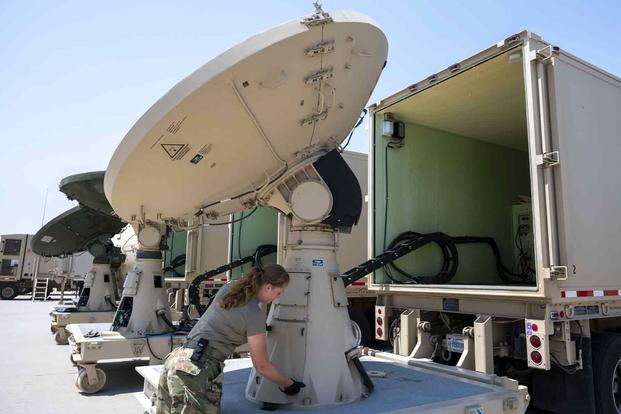Governors of 48 states as well as five U.S. territories are opposing a plan to transfer Air National Guard units with space missions into the active-duty Space Force, a move that would effectively remove state authority over those units.
In a letter published Monday and addressed to Defense Secretary Lloyd Austin, nearly every governor in the U.S. -- excluding Gov. Ron DeSantis of Florida and Gov. Greg Abbott of Texas -- and leaders of American Samoa, Guam, the Northern Mariana Islands, Puerto Rico and the U.S. Virgin Islands decried the potential move proposed by the Air Force.
"Governors must maintain full authority as commanders in chief of these assets to effectively protect operational readiness and America's communities," states the letter, promoted by the National Governors Association. "Legislation that sidesteps, eliminates or otherwise reduces governors' authority within their states and territories undermines longstanding partnerships, precedence, military readiness and operational efficacy."
Read Next: Veterans Scammed Out of GI Bill Benefits Could Get Benefits Restored Under House-Passed Bill
Military.com reported earlier this month that Air Force officials had submitted a draft legislative proposal to Congress titled "Transfer to the Space Force of covered space functions of the Air National Guard of the United States." The proposal would change the status of such operations "from a unit of the Air National Guard of the United States to a unit of the United States Space Force; deactivate the unit; or assign the unit a new federal mission."
The proposal seeks to waive Section 104 of Title 32 and Section 18238 of Title 10 of the U.S. Code, which state, respectively, that "no change in the branch, organization or allotment of a unit located entirely within a state may be made without the approval of its governor" and that National Guard units may "not be relocated or withdrawn under this chapter without the consent of the governor of the state."
While a handful of U.S. governors had spoken out against the plan over the last few weeks, this latest letter marks the most overwhelming response to the Air Force's plan yet.
"Our top priority is the success of critical national security missions, both at home and abroad, which necessitates protecting governors' rights to lead as commanders in chief," the letter reads. "Any federal efforts or legislative actions intended to disregard or weaken these authorities will negatively impact our ability to serve the nation and deeply damage the relationship between states and the federal government."
A Department of the Air Force spokesperson declined to provide comment Tuesday about the letter, only pointing to congressional testimony provided by Air Force and Space Force officials earlier this month. Gen. Chance Saltzman, the head of the Space Force, testified that it would be easier to have those units in a single component, not a new Space National Guard.
Since 2019, when the Space Force became the newest service branch under the Department of the Air Force, debates and conflicts have sprung up over what to do with the roughly 1,000 part-time Air National Guardsmen across 14 units operating space-related missions in Alaska, California, Colorado, Florida, Hawaii, New York and Ohio.
Kendall, in response to a Military.com question earlier this month, said concerns that the proposal would set a precedent undermining state governors' authority were overblown.
"We've had much, much more political attention over this than it deserves," Kendall said. "We need a way to integrate these space capabilities, which are very valuable to us, into the Space Force. This is a unique situation. I have no indication that either the Air Force or Army Guard, anybody, is contemplating any other changes."
Some powerful voices on Capitol Hill are also in the Air Force's corner.
Rep. Mike Rogers, an Alabama Republican and chairman of the House Armed Services Committee, told reporters April 11 that he thought the proposal was "smart" and challenged previous estimates that it would be 1,000 people, saying it would be closer to 600.
Breaking Defense also reported that Rogers said lobbying groups, namely the National Guard Association of the United States, shouldn't "waste their time" fighting the proposal.
Retired Maj. Gen. Frank McGinn, the president of the National Guard Association, said in a statement last week that, despite Rogers' comments, his organization won't back down.
"It wasn't news to us that we're in an uphill struggle," McGinn wrote last week. "The proposal has the full backing of the federal chain of command. Some key congressional defense leaders are also on board. But we have never run from a tough fight."
Related: States Don't Need 'Space Force Militia': Air Force Secretary Defends Move to Bypass Governors













